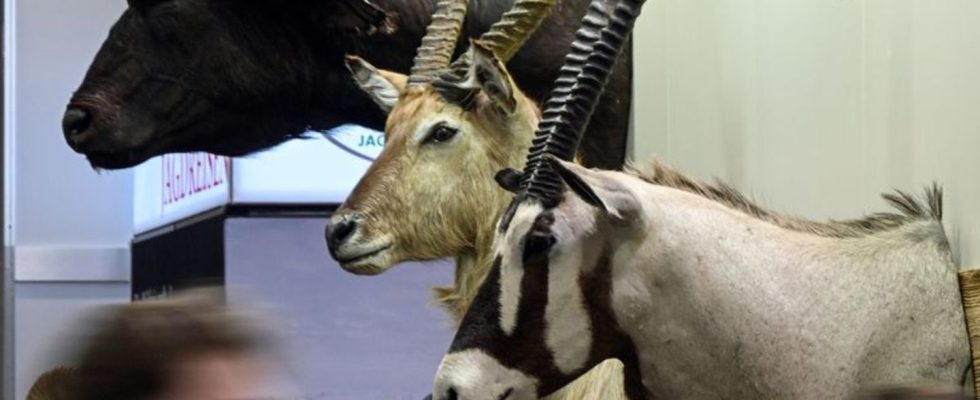Animal rights activists criticize it as reprehensible, while hunters defend trophy hunting as a contribution to species protection. At the Dortmund hunting fair it becomes clear: big game hunting in Africa is big business.
They advertise exclusive hunting experiences in the African wilderness and the opportunity to even shoot elephants or buffalo. Hall 7 of the huge public exhibition “Hunting and Dogs”, where everything revolves around hunting topics until Sunday, is the center of providers of trophy trips to distant countries. What is advertised here at dozens of stands would make many a big game hunter’s dream come true – and animal lovers might shudder.
An irreconcilable battle of interpretation rages over the pros and cons of hunting game in Africa and elsewhere – fueled every year by the protests of animal rights activists on the occasion of the Dortmund hunting fair. The hunting community and all those who benefit from trips abroad are against this. Both sides claim to be committed to protecting species. A look at the different positions of the countries on the African continent underlines how complex the situation is.
A water buffalo is available for 10,000 euros
“Elephant, lion, leopard, buffalo or prairie game – you tell us what you want to shoot, we have a package for you,” advertises the friendly employee of a tour operator from Zimbabwe. A 15-day stay in a hunting camp costs around 20,000 euros, and shooting an elephant costs another 14,000 euros. The local community benefits from the money, she emphasizes.
Price lists from other providers show: While vervet monkeys and baboons are more of a bargain for double-digit kill prices, a water buffalo trophy is already worth 10,000 euros. Killed giraffes are valued at around 1,500 euros, helicopter hunting for warthogs is available for 1,750 euros per hour – including ten hunted specimens.
Many of these offers are “just about shooting and taking home the biggest trophy possible,” criticizes Mona Schweizer from the species protection organization Pro Wildlife. “Shooting for fun – that is ethically reprehensible, unsustainable and violates the animal protection law in Germany.”
Animal rights activists see a real species protection problem
Pro Wildlife and other organizations have been calling for a ban on the import of hunting trophies of protected and threatened species into Germany for years and are putting pressure on the Federal Environment Minister to implement her announcement to further restrict this practice. Trophy hunting not only causes immense animal suffering, but is also a real species protection problem due to the focus on particularly impressive animals with large tusks, horns or manes.
“We need these individuals to maintain populations,” explains Schweizer. The fact that the Dortmund trade fair allows such offers is unacceptable.
Everything is done according to law and order, emphasizes the fair. Exhibits or services that violate national or international regulations are excluded, said a spokesman. Compliance with all the rules is checked every year with experts – and thus “contributes to sustainable, regulated hunting worldwide”.
Hunting tourism brings in millions in income
In Africa, whether wild animals are legally targeted by trophy hunters sometimes literally depends on a river crossing or a pasture hike across a country border: Kenya banned all types of hunting tourism in 1977. In neighboring Tanzania, the national parks authority TAWA praises the country as a destination for hunting tourism with the world’s most lions and the third highest population of elephants.
“Hunting is part of Tanzania’s wildlife protection strategy and a prerequisite for their long-term existence,” it says. According to media reports, hunting tourism generated almost 23 million euros in income in 2022 alone.
Destinations in southern Africa, such as South Africa, Namibia and Zimbabwe, are also popular with hunters who want to follow in Hemingway’s footsteps through the savannah and bush. The Botswana Wildlilfe Producers Association is presenting itself at the Dortmund trade fair. Their representatives want to explain why the state lifted its hunting ban in 2019: “Wild animals are a resource that needs to be managed,” says Isaac Theophilus.
The number of elephants is so high that they have long posed a threat to agriculture and human life. Hunting abroad helps to get the overpopulation under control and at the same time brings in income that can be invested in the preservation of habitats and nature conservation.
Hunting Association: Shooting promotes species protection
These are the same arguments that the German Hunting Association (DJV) uses to defend hunting trips: “The majority of the money that hunters spend stays in the country,” says Stephan Wunderlich, an expert on foreign hunting at the DJV and the International Council for the Conservation of Nature Hunting and Game (CIC). If this does not happen, the current habitats for wild animals would quickly become agricultural land.
Shooting animals makes a contribution to species protection: Only when the game has a value – and it gets it from wealthy foreigners – is it and its habitat worth protecting for the local population.
Christian Schmitt, owner of the Okambara Lodge in Namibia, which started out purely as a guest farm but sees hunting holidays on its own territory as an additional mainstay, sees it pragmatically: “For me it’s a win-win situation,” he says. He only allows shooting of animals whose meat he can use to feed guests and employees.
The almost tame rhinos are not free to be shot, but the paying guest can shoot giraffes. “We have over 100 giraffes that I don’t know personally,” says Schmitt. He is convinced that regulated hunting abroad will not endanger stocks of protected species. Poaching and a population that has no interest in high game populations are a much bigger problem.
“Reality is not a Disney film,” says hunting trip expert Wunderlich. In fact, lions, buffaloes, elephants and the like competed with humans for living space and food. “In this respect, the elephant is just like a wild boar here – only with the difference that wild boars don’t trample people to death.”

